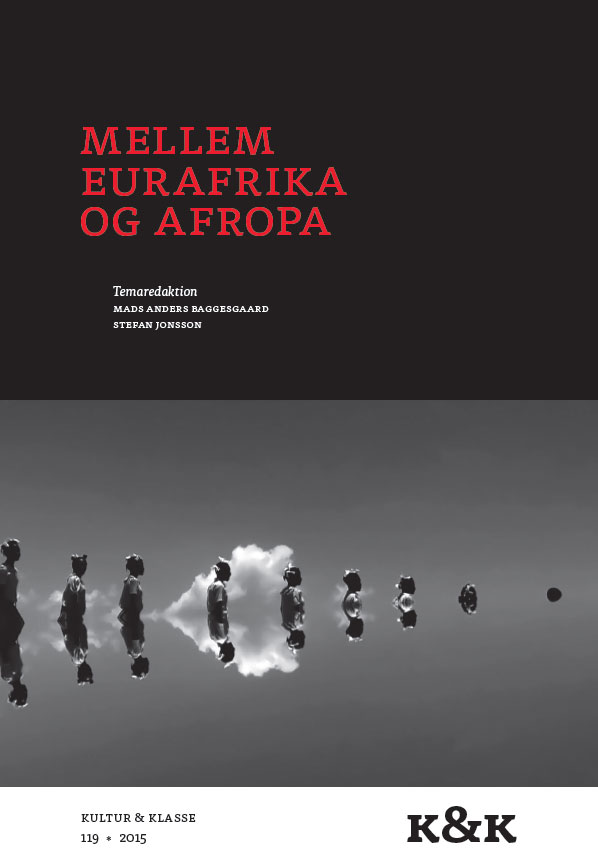Farvebilleder fra det mørke Afrika - Race, krop, økonomi og politik i Mahamet-Saleh Harouns Grigris
DOI:
https://doi.org/10.7146/kok.v43i119.22247Nøgleord:
African cinema, race on film, film and politicsResumé
Analyzing Tchadian director Mahamet-Saleh Haroun’s 2013 film Grigris the article discusses the political potentials of contemporary Sub-Saharan Film. The article rejects frameworks of African and Francophone cinema and argues that a localized understanding of this film in Chad provides a better understanding of the universal and global reach of the engagement with politics that is one of the film’s prime objectives. It is through an understanding of the local and regional society and history that it becomes evident how the film engages with political issues with reach far beyond the borders of Chad. This engagement is performed through the screening of bodies, of race highlighting the role that these entities play in Chadian society and Chadian politics.Referencer
”The Algiers Charter on African Cinema, 1975”. Imruh Bakari og Mbye B. Cham: African Experiences of Cinema. London: British Film Institute, 1996: 25-27.
Barlet, Olivier: ”’C’est le dernier fespaco auquel j’assiste’ entretien d’Olivier Barlet avec Mahamat-Saleh Haroun” [interview] i Africultures, www.africultures.com, 21. marts 2011.
Diallo, Karfa Sira: ”Edito: Haroun Mahamat-Saleh, un cinéaste équivoque ?” [leder], in SENENEWS.com, 6. juli, 2013
Diawara, Manthia: African Cinema: Politics and Culture. Bloomington: Indiana University Press, 1992.
Haroun, Mohammed-Saleh: Grigris, [film]. Chad: Pili Films, 2013.
Harrow, Kenneth W.: Postcolonial African Cinema: From Political Engagement to Postmodernism. Bloomington: Indiana University Press, 2007.
Harrow, Kenneth W.: Trash: African cinema from below. Bloomington: Indiana University Press, 2013.
Hicks, Celeste: Africa’s New Oil: Power, Pipelines and Future Fortunes. London: Zed Books, 2015.
Mbembe, Achille: ”African modes of Self-writing”. Public Culture 14.1 (2002): 239-73.
Mbembe, Achille: On the Postcolony. Berkeley: University of California Press, 2001.
Mbembe, Achille: ”On Politics as a Form of Expenditure”. Jean and John L Comaroff (red.): Law and Disorder in the Postcolony. Chicago: University of Chicago Press, 2006: 299-335.
Mercer, Kobena: ”Looking for Trouble”. Transition 51 (1991): 184-197.
Mercer, Kobena: Welcome to the Jungle: New Positions in Black Cultural Studies. New York: Routledge 2013.
Mitchell, W.J.T.: Seeing Through Race. Cambridge: Harvard University Press, 2012.
Mudimbe, V. Y.: The Idea of Africa. Bloomington: Indiana University Press, 1994.
Murphy, David & Patrick Williams: Postcolonial African Cinema: Ten Directors. Manchester University Press, 2007.
Ogunleye, Foluke: African Film: Looking Back and Looking Forward. Newcastle: Cambridge Scholars Publishing, 2014.
Pfaff, Françoise: Twenty-Five Black African Filmmakers. Westport: Greenwood Press, 1988.
Pfaff, Françoise: ”Eroticism and Sub-Saharan Films”. Imruh Bakari og Mbye B. Cham (red.): African Experiences of Cinema. London: British Film Institute, 1996: 252-61.
Rancière, Jacques: Les écarts du cinéma. Paris: La Fabrique, 2011.
”Resolutions of Third World Film-Makers Meeting, Algiers, Algeria 1973”. Imruh Bakari og Mbye B. Cham (red.): African Experiences of Cinema. London: British Film Institute, 1996: 17-24.
Roitman, Janet: Fiscal Disobedience: An Anthropology of Regulation in Central Africa. Princeton: Princeton University Press, 2005.
Roitman, Janet: ”Unsanctioned Wealth; or, The Productivity of Debt in Northern Cameroon”. Public Culture 15.2 (2003): 211–37
S¸aul, Mahir: ”Art, Politics, and Commerce in Francophone African Cinema”. S˛aul og Ralph A. Austen (red.): Viewing African Cinema in the Twenty-First Century: Art Films and the Nollywood Video Revolution. Athens: Ohio University Press, 2010: 133-59.
Schmidt , Elizabeth: Foreign Intervention in Africa. From the Cold War to the War on Terror. Cambridge: Cambridge University Press, 2013.
Topping, Alexandra: ”Mahamat Saleh Haroun brings Chad to the world, and vice versa, through film” [interview]. The Guardian, 25. februar 2013.
Tcheuyap, Alexie: Postnationalist African Cinemas. Manchester: Manchester University Press, 2011.
Ukadike, Nwachukwu Frank: Black African cinema. Berkeley: University of California Press, 1994.
Ukadike, Nwachukwu Frank: ”Reclaiming Images of Women in Films from Africa and the Black Diaspora”. Imruh Bakari og Mbye B. Cham (red.): African Experiences of Cinema. London: British Film Institute, 1996: 194-208.
Williams, James S.: ”Male Beauty and the Erotics of Intimacy: The Talismanic Cinema of Mahamet-Saleh Haroun”. Film Quarterly 67.4 (2014): 33-43.
Wright, John: Libya, Chad and the Central Sahara. London: Hurst, 1989.
Downloads
Publiceret
Citation/Eksport
Nummer
Sektion
Licens
Tidsskriftet følger dansk ophavsret.





